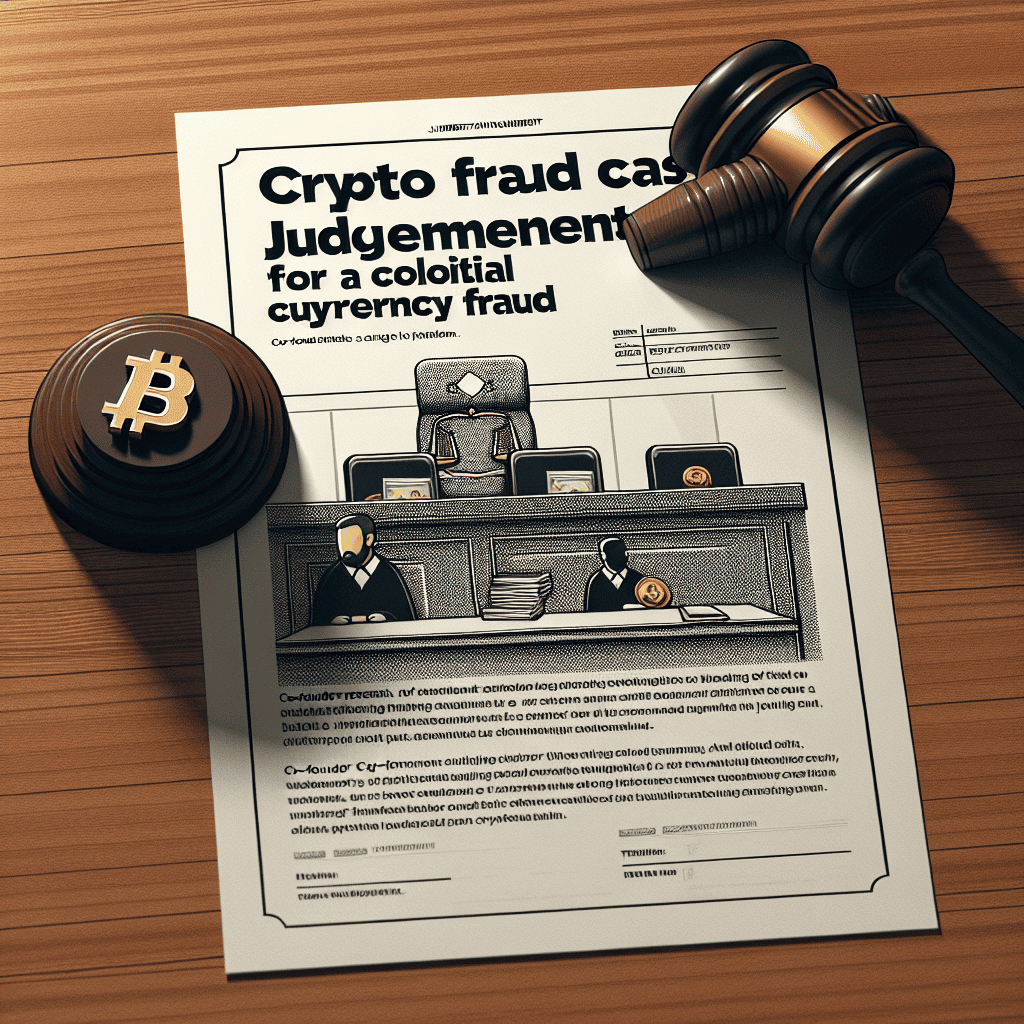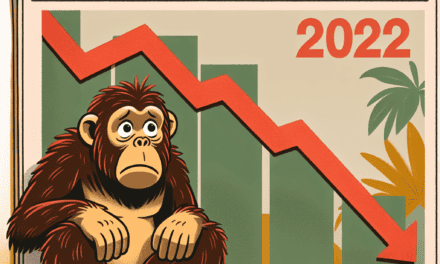“Crypto Deception: Centra Tech Co-Founder Faces 8-Year Sentence for Fraud”
Introduction
In a significant legal development, the co-founder of Centra Tech, a cryptocurrency company, has been sentenced to eight years in prison for orchestrating a large-scale fraud scheme. The case, which has drawn considerable attention within the financial and tech communities, involved misleading investors through false claims about the company’s partnerships and regulatory compliance. The fraudulent activities resulted in substantial financial losses for investors, highlighting the risks associated with the rapidly evolving cryptocurrency market. This sentencing underscores the legal system’s commitment to addressing and penalizing fraudulent practices in the digital currency sector.
Overview Of The Centra Tech Crypto Fraud Case
In a significant development within the cryptocurrency sector, Sohrab Sharma, co-founder of the now-defunct Centra Tech, has been sentenced to eight years in prison for his role in orchestrating a massive fraud scheme. This case has drawn considerable attention, highlighting the potential for deception within the rapidly evolving world of digital currencies. The Centra Tech case serves as a cautionary tale, illustrating the vulnerabilities that can arise in the absence of stringent regulatory oversight and the ease with which unsuspecting investors can be misled.
Centra Tech, founded in 2017, initially garnered attention by promising to revolutionize the cryptocurrency market through its innovative financial products. The company claimed to offer a range of services, including a digital currency debit card that would allow users to seamlessly convert cryptocurrencies into fiat money. This ambitious vision attracted significant interest from investors, who were eager to capitalize on the burgeoning crypto market. However, as the case unfolded, it became evident that the company’s promises were built on a foundation of deceit.
The fraudulent activities orchestrated by Sharma and his co-conspirators were multifaceted. Central to their scheme was an initial coin offering (ICO) that raised over $25 million from investors. During this ICO, Centra Tech made a series of false claims, including partnerships with major financial institutions such as Visa and Mastercard. These assertions were designed to lend credibility to the venture and entice investors with the prospect of substantial returns. However, investigations later revealed that these partnerships were entirely fictitious, and the company’s technological capabilities were grossly exaggerated.
As the fraudulent nature of Centra Tech’s operations came to light, the U.S. Securities and Exchange Commission (SEC) and the Department of Justice (DOJ) launched investigations into the company’s activities. These investigations uncovered a web of deceit, with Sharma and his associates fabricating key aspects of their business model to create an illusion of legitimacy. The case against Sharma was bolstered by evidence of his direct involvement in crafting misleading marketing materials and making false statements to potential investors.
The sentencing of Sohrab Sharma marks a significant milestone in the ongoing efforts to combat fraud within the cryptocurrency industry. It underscores the importance of regulatory bodies in safeguarding investor interests and maintaining the integrity of financial markets. Moreover, this case serves as a stark reminder to investors of the need for due diligence when engaging with emerging technologies and financial products. The allure of high returns can often overshadow the risks associated with investing in unregulated markets, making it imperative for individuals to thoroughly vet opportunities before committing their resources.
In conclusion, the Centra Tech crypto fraud case exemplifies the challenges faced by regulators and investors in navigating the complex landscape of digital currencies. While the sentencing of Sharma provides a measure of justice for those defrauded, it also highlights the ongoing need for vigilance and transparency within the industry. As cryptocurrencies continue to gain traction, fostering an environment of trust and accountability will be crucial in ensuring the sustainable growth of this innovative financial sector. The lessons learned from this case will undoubtedly inform future regulatory frameworks and investor strategies, ultimately contributing to a more secure and reliable cryptocurrency ecosystem.
Key Players Involved In The Centra Tech Scandal
The Centra Tech scandal, a significant event in the cryptocurrency world, has drawn considerable attention due to its scale and the involvement of high-profile individuals. At the heart of this controversy is Sohrab Sharma, the co-founder of Centra Tech, who was recently sentenced to eight years in prison for his role in orchestrating a massive fraud scheme. This case not only highlights the potential for deception within the burgeoning cryptocurrency industry but also underscores the importance of regulatory oversight and due diligence.
Sohrab Sharma, along with his co-founders Robert Farkas and Raymond Trapani, launched Centra Tech in 2017, promoting it as a cutting-edge financial technology company. They claimed that Centra Tech was developing a range of cryptocurrency-related products, including a debit card that would allow users to make purchases with digital currencies at any business accepting major credit cards. This ambitious promise attracted significant attention and investment, as it seemed to offer a seamless bridge between traditional financial systems and the emerging world of cryptocurrencies.
However, as investigations later revealed, many of the claims made by Sharma and his associates were grossly exaggerated or entirely fabricated. For instance, they falsely asserted that Centra Tech had established partnerships with major financial institutions such as Visa and Mastercard. These misleading statements were instrumental in convincing investors to pour over $25 million into the company’s initial coin offering (ICO). The allure of a revolutionary product, combined with the credibility seemingly lent by these supposed partnerships, created a perfect storm of investor enthusiasm and trust.
As the truth began to unravel, it became evident that the Centra Tech operation was built on a foundation of deceit. The company’s products were either non-existent or far from the advanced stage of development that had been advertised. Furthermore, the founders engaged in a series of deceptive practices to maintain the illusion of legitimacy, including the use of fake executive profiles and fabricated business relationships. These actions not only defrauded investors but also cast a shadow over the entire cryptocurrency industry, which was already grappling with issues of trust and transparency.
The legal proceedings that followed were closely watched, as they were seen as a test case for how the judicial system would handle fraud in the relatively unregulated world of cryptocurrencies. Sharma’s sentencing to eight years in prison serves as a stark warning to others in the industry about the severe consequences of engaging in fraudulent activities. It also highlights the critical role of regulatory bodies in protecting investors and maintaining the integrity of financial markets.
In addition to Sharma, his co-founders Farkas and Trapani also faced legal repercussions for their involvement in the scheme. Farkas was sentenced to one year in prison, while Trapani received a sentence of 18 months. These outcomes reflect the varying degrees of culpability among the key players, as well as the judicial system’s commitment to holding individuals accountable for their actions.
The Centra Tech scandal serves as a cautionary tale for both investors and entrepreneurs in the cryptocurrency space. It underscores the necessity of conducting thorough due diligence before investing in any venture, particularly in an industry that is still evolving and often lacks comprehensive regulatory oversight. As the cryptocurrency market continues to grow, the lessons learned from this case will undoubtedly influence future regulatory frameworks and investor behavior, ultimately contributing to a more transparent and trustworthy financial ecosystem.
Legal Ramifications Of The Centra Tech Fraud
The sentencing of Centra Tech co-founder Robert Farkas to eight years in prison marks a significant moment in the ongoing battle against cryptocurrency fraud. This case, which has captured the attention of both legal experts and the general public, underscores the serious legal ramifications that can arise from fraudulent activities in the rapidly evolving world of digital currencies. As the cryptocurrency market continues to expand, so too does the potential for illicit schemes that exploit the lack of regulation and the complexity of blockchain technology. The Centra Tech case serves as a cautionary tale for both investors and entrepreneurs in the crypto space.
Farkas, along with his co-founders, orchestrated a fraudulent initial coin offering (ICO) that raised over $25 million from investors. They falsely claimed that their company had developed a suite of financial products, including a debit card backed by major credit card companies, which would allow users to seamlessly convert cryptocurrencies into fiat currency. However, these claims were entirely fabricated, and the promised technology did not exist. The deception was further compounded by the use of celebrity endorsements, which lent an air of legitimacy to the fraudulent venture and attracted a significant number of unsuspecting investors.
The legal proceedings against Farkas and his associates highlight the severe consequences of engaging in fraudulent activities within the cryptocurrency sector. The U.S. Securities and Exchange Commission (SEC) and the Department of Justice (DOJ) have been increasingly vigilant in their efforts to crack down on crypto-related fraud, and the Centra Tech case is a prime example of their commitment to protecting investors and maintaining the integrity of financial markets. The eight-year prison sentence handed down to Farkas reflects the gravity of his offenses and serves as a deterrent to others who may be considering similar schemes.
Moreover, this case has broader implications for the regulation of cryptocurrencies and the ICO market. It has prompted calls for more stringent oversight and clearer guidelines to prevent such fraudulent activities from occurring in the future. While the decentralized nature of cryptocurrencies presents unique challenges for regulators, it is imperative that measures are put in place to safeguard investors and ensure that the market operates fairly and transparently. The Centra Tech fraud has highlighted the need for a balanced approach that fosters innovation while protecting consumers from potential harm.
In addition to the legal ramifications for those directly involved in the fraud, the case has also had a significant impact on the victims who invested in the ICO. Many investors have suffered substantial financial losses, and the process of seeking restitution can be lengthy and complex. This underscores the importance of conducting thorough due diligence before investing in any cryptocurrency venture, as well as the need for increased investor education to help individuals make informed decisions in this high-risk market.
In conclusion, the sentencing of Robert Farkas for his role in the Centra Tech fraud serves as a stark reminder of the potential legal consequences of engaging in deceptive practices within the cryptocurrency industry. As the market continues to grow, it is crucial for both regulators and participants to remain vigilant in order to prevent similar incidents from occurring in the future. By learning from the lessons of the Centra Tech case, the industry can work towards creating a more secure and trustworthy environment for all stakeholders involved.
Impact Of The Centra Tech Case On The Crypto Industry

The sentencing of Centra Tech co-founder Robert Farkas to eight years in prison marks a significant moment in the ongoing narrative of cryptocurrency regulation and enforcement. This case, which involved a fraudulent initial coin offering (ICO) that raised over $25 million from investors, underscores the critical need for transparency and accountability within the burgeoning crypto industry. As the sector continues to evolve, the implications of this case are far-reaching, influencing regulatory approaches, investor confidence, and the overall perception of digital currencies.
To begin with, the Centra Tech case highlights the vulnerabilities that exist within the cryptocurrency market, particularly in the realm of ICOs. These fundraising mechanisms, which allow companies to raise capital by issuing digital tokens, have been a popular method for startups to secure funding. However, the lack of stringent regulatory oversight has made them a fertile ground for fraudulent activities. The Centra Tech ICO, which falsely claimed partnerships with major financial institutions and misled investors about the viability of its products, serves as a cautionary tale. It illustrates the potential for deception and underscores the necessity for more robust regulatory frameworks to protect investors.
In response to such fraudulent activities, regulatory bodies around the world are increasingly scrutinizing the crypto industry. The U.S. Securities and Exchange Commission (SEC), for instance, has been actively pursuing cases against fraudulent ICOs, signaling a more aggressive stance towards enforcement. The Centra Tech case is likely to embolden regulators to continue their efforts in cracking down on fraudulent schemes, thereby fostering a more secure environment for investors. This increased regulatory scrutiny, while potentially stifling innovation in the short term, could ultimately lead to a more stable and trustworthy market, encouraging more widespread adoption of cryptocurrencies.
Moreover, the case has significant implications for investor confidence. The promise of high returns has attracted many to the crypto market, but incidents like the Centra Tech fraud can erode trust. Investors may become more cautious, demanding greater transparency and due diligence before committing their funds. This shift in investor behavior could drive companies to adopt more rigorous standards of accountability and governance, thereby enhancing the overall credibility of the industry.
Furthermore, the Centra Tech case has broader implications for the perception of cryptocurrencies. While digital currencies have been lauded for their potential to revolutionize financial systems, they have also been criticized for their association with illicit activities. High-profile fraud cases can reinforce negative stereotypes, potentially hindering the mainstream acceptance of cryptocurrencies. However, as the industry matures and regulatory measures are strengthened, there is an opportunity to reshape public perception. By demonstrating a commitment to ethical practices and compliance, the crypto industry can work towards building a reputation as a legitimate and innovative sector.
In conclusion, the sentencing of Robert Farkas in the Centra Tech case serves as a pivotal moment for the cryptocurrency industry. It underscores the urgent need for enhanced regulatory oversight, greater transparency, and improved investor protection. While the case highlights the challenges facing the industry, it also presents an opportunity for growth and maturation. As regulators, investors, and companies navigate this evolving landscape, the lessons learned from the Centra Tech case will undoubtedly play a crucial role in shaping the future of cryptocurrencies. Through increased accountability and a commitment to ethical practices, the industry can work towards realizing its full potential while safeguarding the interests of all stakeholders involved.
Lessons Learned From The Centra Tech Fraud
The sentencing of Centra Tech co-founder Robert Farkas to eight years in prison marks a significant moment in the ongoing saga of cryptocurrency fraud. This case serves as a stark reminder of the potential pitfalls within the rapidly evolving world of digital currencies. As the cryptocurrency market continues to expand, it is crucial for investors, regulators, and industry participants to glean valuable lessons from such high-profile fraud cases to prevent future occurrences and protect the integrity of the market.
One of the primary lessons from the Centra Tech fraud is the importance of due diligence. Investors were lured by the promise of high returns and the allure of cutting-edge technology, yet many failed to conduct thorough research into the legitimacy of the company and its claims. Centra Tech falsely advertised partnerships with major financial institutions and misled investors about the capabilities of its products. This underscores the necessity for investors to verify claims independently and seek out credible sources of information before committing their funds. In an industry where innovation often outpaces regulation, skepticism and careful scrutiny are essential tools for any investor.
Moreover, the Centra Tech case highlights the critical role of regulatory oversight in the cryptocurrency space. The lack of comprehensive regulation has created an environment where fraudulent schemes can flourish. While the decentralized nature of cryptocurrencies presents unique challenges for regulators, it is imperative that they develop frameworks that balance innovation with consumer protection. The involvement of the U.S. Securities and Exchange Commission (SEC) in prosecuting the Centra Tech fraud demonstrates the agency’s commitment to cracking down on fraudulent activities. However, it also signals the need for more proactive measures to prevent such schemes from taking root in the first place.
In addition to regulatory oversight, the Centra Tech fraud underscores the importance of transparency and accountability within the cryptocurrency industry. Companies operating in this space must prioritize clear communication and honest representation of their products and services. The deceptive practices employed by Centra Tech, including the use of celebrity endorsements to lend credibility to their fraudulent claims, highlight the need for ethical standards and accountability. Industry participants must work collaboratively to establish best practices and self-regulatory measures that promote transparency and build trust with consumers.
Furthermore, the case serves as a cautionary tale about the potential consequences of greed and unethical behavior. The pursuit of personal gain at the expense of others ultimately led to severe legal repercussions for those involved in the Centra Tech fraud. This should serve as a deterrent to individuals considering similar schemes and a reminder that integrity and ethical conduct are paramount in any business endeavor. The long-term success of the cryptocurrency industry depends on the trust and confidence of its participants, which can only be achieved through ethical practices and a commitment to doing what is right.
In conclusion, the Centra Tech fraud offers several important lessons for the cryptocurrency industry and its stakeholders. By emphasizing due diligence, regulatory oversight, transparency, and ethical behavior, the industry can work towards preventing future frauds and fostering a more secure and trustworthy environment for investors. As the digital currency landscape continues to evolve, these lessons will be instrumental in shaping a sustainable and resilient market that benefits all participants.
The Role Of Regulation In Preventing Crypto Scams
The recent sentencing of Centra Tech co-founder to eight years in prison for orchestrating a massive cryptocurrency fraud underscores the critical need for robust regulatory frameworks in the rapidly evolving digital currency landscape. As cryptocurrencies continue to gain traction, their decentralized nature and the anonymity they offer have made them attractive not only to legitimate investors but also to fraudsters seeking to exploit these features for illicit gains. This case serves as a stark reminder of the vulnerabilities inherent in the crypto market and highlights the essential role that regulation must play in safeguarding investors and maintaining market integrity.
Cryptocurrency scams, such as the one perpetrated by Centra Tech, often involve misleading investors with false promises and fabricated information. In this instance, the co-founders falsely claimed that their company had developed a debit card backed by major financial institutions, which would allow users to seamlessly convert cryptocurrencies into fiat currency. Such deceptive practices prey on the lack of understanding and the speculative nature of the crypto market, leading to significant financial losses for unsuspecting investors. Consequently, the need for regulatory oversight becomes apparent, as it can help establish clear guidelines and standards that protect consumers from fraudulent schemes.
Regulation in the cryptocurrency space can serve multiple purposes. Firstly, it can enhance transparency by requiring companies to disclose pertinent information about their operations, financial health, and the risks associated with their products. This transparency is crucial in enabling investors to make informed decisions and in fostering trust in the market. Moreover, regulatory measures can deter potential fraudsters by imposing stringent penalties for non-compliance and fraudulent activities, thereby creating a more secure environment for all market participants.
Furthermore, regulation can facilitate the development of a standardized framework for the issuance and trading of cryptocurrencies. By establishing clear rules and procedures, regulators can help mitigate the risks associated with market manipulation and ensure fair trading practices. This, in turn, can contribute to the stabilization of the market, reducing volatility and enhancing its appeal to institutional investors who may have been hesitant to enter the space due to concerns over its unregulated nature.
However, the implementation of regulatory measures in the cryptocurrency sector is not without its challenges. The decentralized and borderless nature of digital currencies complicates the enforcement of regulations, as activities can easily transcend national boundaries. This necessitates international cooperation and coordination among regulatory bodies to effectively address the global nature of crypto markets. Additionally, regulators must strike a delicate balance between protecting investors and fostering innovation, ensuring that regulations do not stifle the growth and potential benefits of blockchain technology.
In light of these considerations, it is evident that regulation plays a pivotal role in preventing crypto scams and ensuring the long-term sustainability of the cryptocurrency market. The Centra Tech case serves as a cautionary tale, illustrating the potential consequences of inadequate oversight and the urgent need for comprehensive regulatory frameworks. As the crypto landscape continues to evolve, regulators must remain vigilant and adaptive, working collaboratively with industry stakeholders to develop policies that protect investors while promoting innovation. By doing so, they can help build a more secure and trustworthy environment for the burgeoning world of digital currencies, ultimately benefiting both investors and the broader financial ecosystem.
Future Implications For Crypto Investors Post-Centra Tech Scandal
The sentencing of Centra Tech co-founder Sohrab Sharma to eight years in prison marks a significant moment in the ongoing narrative of cryptocurrency regulation and investor protection. This case, which involved a fraudulent initial coin offering (ICO) that raised over $25 million from investors, underscores the critical need for vigilance and due diligence in the rapidly evolving world of digital currencies. As the crypto market continues to expand, the implications of this scandal are profound, offering both cautionary lessons and potential pathways for future regulatory frameworks.
The Centra Tech case serves as a stark reminder of the vulnerabilities inherent in the cryptocurrency market. Despite the promise of decentralization and innovation, the lack of comprehensive regulation has often left investors exposed to fraudulent schemes. Sharma and his associates capitalized on this regulatory gap, luring investors with false claims of partnerships with major financial institutions and the promise of a revolutionary financial product. This deception not only resulted in significant financial losses for investors but also highlighted the ease with which bad actors can exploit the crypto ecosystem.
In light of this scandal, the role of regulatory bodies becomes increasingly crucial. Governments and financial authorities worldwide are now more aware of the need to establish clear guidelines and enforce stringent measures to protect investors. The Centra Tech debacle has accelerated discussions around the implementation of more robust regulatory frameworks that can effectively oversee ICOs and other crypto-related activities. Such regulations could include mandatory disclosures, third-party audits, and stringent penalties for fraudulent activities, thereby fostering a safer investment environment.
Moreover, the Centra Tech case has implications for the broader perception of cryptocurrencies. While digital currencies have gained popularity for their potential to democratize finance and offer new investment opportunities, incidents like this can erode public trust. For the crypto industry to thrive, it is imperative that stakeholders work collaboratively to restore confidence. This involves not only adhering to regulatory standards but also promoting transparency and accountability within the industry. By doing so, the crypto community can demonstrate its commitment to ethical practices and long-term sustainability.
For investors, the lessons from the Centra Tech scandal are clear. Due diligence is paramount when considering investments in the crypto space. Investors must be vigilant, conducting thorough research and seeking out credible information before committing their funds. This includes scrutinizing the legitimacy of ICOs, understanding the technology behind the projects, and evaluating the track record of the individuals involved. By adopting a cautious and informed approach, investors can mitigate risks and make more informed decisions.
Looking ahead, the Centra Tech case may serve as a catalyst for positive change within the crypto industry. As regulatory frameworks evolve and investor awareness increases, the market could become more resilient to fraudulent activities. This, in turn, could attract a broader range of participants, including institutional investors who have been hesitant to enter the space due to concerns over security and regulation. Ultimately, the lessons learned from this scandal could pave the way for a more mature and stable cryptocurrency market.
In conclusion, the sentencing of Sohrab Sharma is a pivotal moment that underscores the need for enhanced regulation and investor protection in the cryptocurrency industry. While the Centra Tech scandal has exposed significant vulnerabilities, it also offers an opportunity for growth and improvement. By fostering a culture of transparency, accountability, and due diligence, the crypto community can build a more secure and trustworthy environment for all participants.
Q&A
1. **Who was sentenced in the Centra Tech crypto fraud case?**
Sohrab “Sam” Sharma, a co-founder of Centra Tech, was sentenced.
2. **What was the length of the prison sentence given to the Centra Tech co-founder?**
Sharma was sentenced to 8 years in prison.
3. **What was the nature of the fraud committed by Centra Tech?**
The fraud involved a fraudulent initial coin offering (ICO) that misled investors with false claims about partnerships and licenses.
4. **How much money did Centra Tech raise through its fraudulent ICO?**
Centra Tech raised approximately $25 million from investors through the fraudulent ICO.
5. **What false claims did Centra Tech make to attract investors?**
Centra Tech falsely claimed to have partnerships with major financial institutions like Visa and Mastercard and to have licenses in 38 states.
6. **What was the role of Sohrab Sharma in the Centra Tech scheme?**
Sharma was a co-founder and played a key role in orchestrating and promoting the fraudulent ICO.
7. **What were the legal consequences for other individuals involved in the Centra Tech fraud?**
Other co-founders, including Robert Farkas, were also charged and sentenced for their roles in the fraud.
Conclusion
The sentencing of Centra Tech co-founder to eight years in prison underscores the severe legal consequences of engaging in fraudulent activities within the cryptocurrency sector. This case highlights the importance of regulatory compliance and transparency in the rapidly evolving digital currency market. It serves as a cautionary tale for entrepreneurs and investors, emphasizing the need for due diligence and ethical conduct to maintain trust and integrity in financial innovations. The outcome also reflects the judiciary’s commitment to protecting investors and upholding the law in the face of emerging technological advancements.





